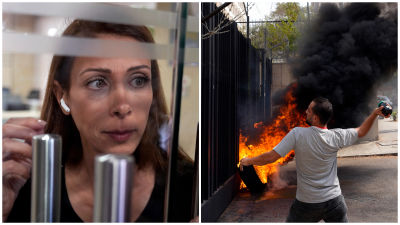Lawmaker demands trapped bank savings as Lebanese cash crisis worsens

A Lebanese member of Parliament has walked into a Beirut bank with her lawyer to demand access to her savings in the latest in a series of stand-offs between banks and their customers in the country.
Cynthia Zarazir arrived at a Byblos Bank branch to ask for $8,500 of her own money to cover the cost of a surgery. Her demands come as informal limits on cash withdrawals from Lebanon’s banks remain in place.
Since 2019 - when the limits were introduced - three-quarters of the population have plunged into poverty, and the Lebanese pound lost 90% of its value against the dollar.
“I am a Lebanese citizen demanding my rights in light of this exceptional situation,” Ms Zarazir told the press and bystanders.
Her lawyer Fouad Debs, a member of legal and advocacy group the Depositors’ Union, said the bank initially offered a “ridiculous” proposal to withdraw her savings in Lebanese pounds at a fraction of its dollar value.
However, after hours of negotiation Ms Zarazir left the bank having secured the money she needed.
Meanwhile, dozens of protesters demonstrated at the Central Bank’s headquarters in Beirut, where they could be seen hurling rocks and molotov cocktails towards the building. They also set ties on fire at the entrance.
In other place like Byblos, a man fired an assault rifle at the glass front of a bank branch, after employees did not let him in without an appointment.
And another man stormed a bank branch in the southern Beirut suburb of Dahiyeh demanding some of his trapped savings. According to depositors' advocacy groups, he was unarmed.
The general public has commended the bank heists, some even hailing the perpetrators as heroes.
Among the well-known cases was Sally Hafez, who last month stormed a Beirut bank branch with a fake pistol and gasoline canister to take some $13,000 to fund her 23-year-old sister’s cancer treatment.
However the banks have condemned the angry depositors' actions, and said in a statement the Lebanese government is primarily to blame for the crisis.
Last month, the banks closed for a week after at least seven banks were raided, and have since only partially reopened.
Fouad Debs, who alongside the Depositors' Union has tried to help depositors unlock their trapped savings, said the situation is no longer bearable and that Lebanon needs to reform its economy to become viable again.
“What we want is a collective solution which would be through a recovery plan that's fair, comprehensive, transparent, and includes the restructuring of the banks and public debt,” he said, adding the politicians and bankers should be held accountable for the crisis.
For more than two years, Lebanon has been struggling to reach an agreement with the International Monetary Fund for a bailout programme.
The country's government and divided parliament have stalled over about a dozen mandatory reforms ever since they reached an agreement in April.
This includes restructuring its banks, implementing formal capital controls, and reforming its outdated bank secrecy laws.
The United Nations and IMF have both criticised Lebanon.